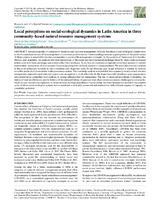Mostrar el registro sencillo del ítem
Local perceptions on social-ecological dynamics in Latin America in three community-based natural resource management systems
| dc.contributor.author | Delgado Serrano, María del Mar | |
| dc.contributor.author | Oteros-Rozas, Elisa | |
| dc.contributor.author | Vanwildemeersch, Pieter | |
| dc.contributor.author | Ortiz-Guerrero, Cesar E. | |
| dc.contributor.author | London, Silvia | |
| dc.contributor.author | Escalante Semerena, Roberto I. | |
| dc.date.accessioned | 2017-11-27T09:48:01Z | |
| dc.date.available | 2017-11-27T09:48:01Z | |
| dc.date.issued | 2015 | |
| dc.identifier.uri | http://hdl.handle.net/10396/15510 | |
| dc.description.abstract | Several examples of community-based natural resource management in Latin American social-ecological systems exist in which communities control the management of common-pool resources. Understanding community perceptions of the performance of these systems is essential to involve communities in sustainable management strategies. In this analysis of three areas in Colombia, Mexico, and Argentina, we analyzed the local perceptions of the social and environmental challenges faced by these social-ecological systems and how these challenges and drivers affect their resilience. To do this, we combined prospective structural analysis to unravel stakeholders’ perceptions of each system’s functioning along with network analysis to assess resilience. We identified external variables as the most influential variables in the Colombian and Argentine cases. In the Mexican case, larger influence is exerted by internal variables, particularly those linked to the governance system. The case study analysis revealed that the community-based natural resource management approach needs external support and recognition to work effectively. In the Argentine and Colombian cases, megaprojects were perceived as controllers with medium or strong influence but low dependence. The use of ancestral knowledge (Colombia), the history of land use (Mexico), and the history of the artisanal fishery (Argentina) were all perceived as common challenges to communitybased natural resource management. In terms of social-ecological resilience, framed within the three-dimensional model of the adaptive cycle, all three social-ecological systems were considered to be highly connected and resilient but with different degrees of capacity or cumulative potential. | es_ES |
| dc.format.mimetype | application/pdf | es_ES |
| dc.language.iso | eng | es_ES |
| dc.publisher | Resilience Alliance | es_ES |
| dc.rights | https://creativecommons.org/licenses/by-nc-nd/4.0/ | es_ES |
| dc.source | Ecology and Society 20, (4): 24 (2015) | es_ES |
| dc.subject | Argentina | es_ES |
| dc.subject | Colombia | es_ES |
| dc.subject | Common-pool resources | es_ES |
| dc.subject | Environmental challenges | es_ES |
| dc.subject | Governance | es_ES |
| dc.subject | Mexico | es_ES |
| dc.subject | Network analysis | es_ES |
| dc.subject | Ostrom | es_ES |
| dc.subject | Prospective structural analysis | es_ES |
| dc.subject | Social-ecological resilience | es_ES |
| dc.title | Local perceptions on social-ecological dynamics in Latin America in three community-based natural resource management systems | es_ES |
| dc.type | info:eu-repo/semantics/article | es_ES |
| dc.relation.publisherversion | http://dx.doi.org/10.5751/ES-07965-200424 | es_ES |
| dc.relation.projectID | info:eu-repo/grantAgreement/EC/FP7/282845 (COMET-LA) | es_ES |
| dc.rights.accessRights | info:eu-repo/semantics/openAccess | es_ES |

